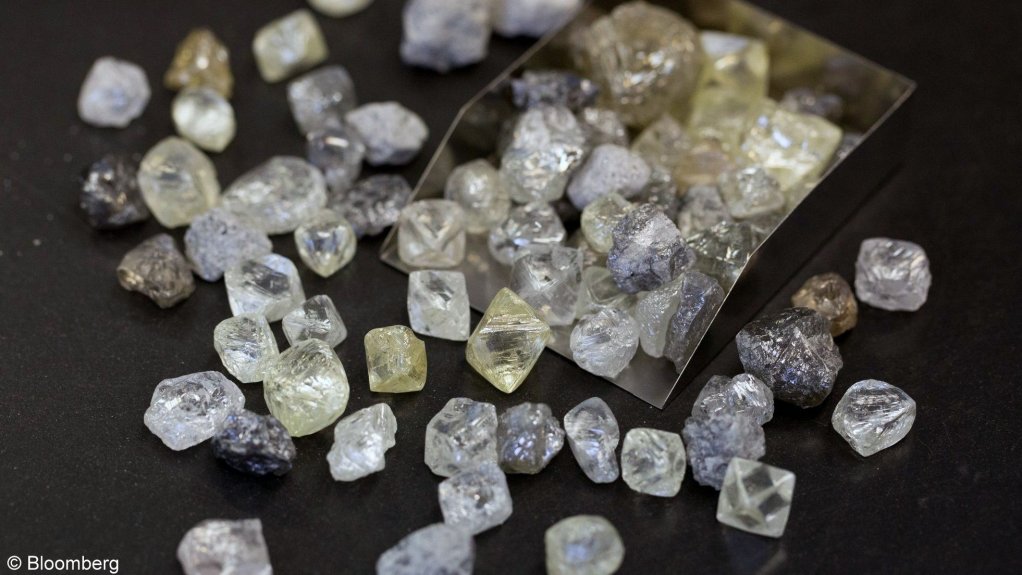Highlights
The Masters of the Diamond World Are Losing Control

(Bloomberg) — For decades, shopping for uncut diamonds was a tightly scripted affair: First, persuade De Beers to add you to its list of handpicked customers. Then, 10 times a year, attend a week-long sale to buy exactly the amount De Beers offers you at whatever price it chooses.
The system, which works more or less the same at Russian rival Alrosa PJSC, gave the two miners a tight grip on their market. With the coronavirus wreaking havoc through the industry, that control is now disintegrating.
De Beers struggled to generate much interest from its customers to even look at this month’s diamond sale, despite bending over backward to attract purchases, according to people familiar with the matter. At Alrosa, at least five buyers have broken from their long-term contracts because they can’t make money under the current terms, said the people, who asked not to be identified discussing private information.
The lack of sales is likely to hit profits hard for the two biggest producers, although it probably won’t affect the price of diamond jewelry in stores. The rough-diamond trading freeze is also creating billions of dollars of stock buildup for the miners that threatens to undermine an eventual recovery in the market.
With jewelry stores closed, cutters and polishers stuck at home and global travel at a standstill, De Beers and Alrosa have made several concessions to their normal sales rules — allowing customers to renege on contracts and view diamonds in alternative locations. Crucially, though, they’ve refused to cut prices, in an attempt to shore up the market. That’s turned into a sticking point for many buyers.
While the biggest diamond miners are refusing to budge on prices, distressed smaller rivals are offering discounts of as much as 25%, meaning buyers who have limited demand are able to get the goods they need from them instead.
“De Beers and Alrosa are sincerely trying to protect value,” said Anish Aggarwal, a partner at specialist advisory firm Gemdax. “They are definitely trying to do the right thing, but the unprecedented economics of the current situation limits both buyers’ and sellers’ room to manoeuvre.”
Alrosa buyers are also protesting the company’s more-stringent enforcement of its contract, which requires customers to buy goods they’ve deferred, while De Beers has been more flexible.
Two buyers had their long-term contracts with Alrosa ended in April, the miner said on April 10. One of those was Diacore, the diamond-trading company owned by the billionaire Steinmetz diamond family and one of the most powerful middlemen companies in the industry, according to people familiar with the situation. Three more Alrosa buyers left in the last month, according to the people, including Antwerp-based Arjav Diamonds.
Read: The Great Diamond Glut: Miners Stuck With Gems Worth Billions
“Our sales policy received a robust support from our clients and other industry members,” said Alrosa chief of sales Evgeny Agureev. “The price stability is a key for many of our clients’ financial solvency, as it prevents the depreciation of their stocks,” he said.
Alrosa hasn’t seen a reason for a price correction yet, he said.
“The issue is not in prices,” Agureev said. “It’s about a demand volume which suffered a lot since people were sitting at home.”
A De Beers spokesman declined to comment.
De Beers’s customers have largely welcomed its actions, especially in allowing them to defer purchases without any punitive repercussions. Traditionally, refusing to buy your allocated diamonds meant being offered fewer stones in the future or even losing access altogether.
However, the company is struggling to convince any of them to buy. It’s offered to show diamonds to customers in trading hubs including Antwerp this week — instead of insisting they travel to Botswana as usual — and told its buyers that the sale could be extended to as long as three weeks, according to people familiar with the situation.
Yet only a few of its 80-odd customers actually turned up to look at them, said the people.
While the big producers may face pressure to lower prices, it’s a complicated decision.
“If they cut prices at this point it sets off a chain reaction,” said Ben Davis, an analyst at Liberum. “Not just for the miners, but for the whole industry, including the midstream.”
-

 Banking & Finance2 months ago
Banking & Finance2 months agoOman Oil Marketing Company Concludes Its Annual Health, Safety, Environment, and Quality Week, Reaffirming People and Safety as a Top Priority
-

 News2 months ago
News2 months agoJamal Ahmed Al Harthy Honoured as ‘Pioneer in Youth Empowerment through Education and Sport’ at CSR Summit & Awards 2025
-

 OER Magazines2 months ago
OER Magazines2 months agoOER, December 2025
-

 News2 months ago
News2 months agoAI Security Conference 2025 Hosted by Securado Highlights the Changing Cybersecurity Landscape
-

 Insurance1 month ago
Insurance1 month agoSupporting Community Wellness: Liva Insurance Sponsors Muscat Marathon 2026 with Free Health Checkups
-

 Interviews1 month ago
Interviews1 month agoEXCLUSIVE INTERVIEW: TLS Rebranding Marks Strategic Leap Toward Innovation, Sustainability & Growth
-

 Insurance4 weeks ago
Insurance4 weeks agoLiva Insurance Supports Community Wellness Through “Experience Oman – Muscat Marathon 2026”
-

 Investment2 weeks ago
Investment2 weeks agoLalan Inaugurates Its First Overseas Manufacturing Facility, Marking Sri Lanka’s First Investment in SOHAR Freezone





























